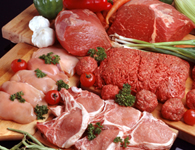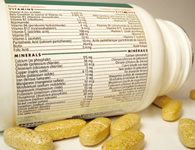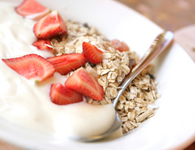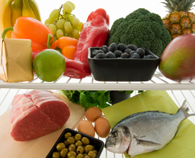Balanced Nutrition
 The essential nutrients are Carbohydrates (CHO), Proteins, Fats, Vitamins & Minerals, Electrolytes and Water. Of these, CHO, proteins and Fats are energy providing nutrients. All essential nutrients must be supplied by the diet.
The essential nutrients are Carbohydrates (CHO), Proteins, Fats, Vitamins & Minerals, Electrolytes and Water. Of these, CHO, proteins and Fats are energy providing nutrients. All essential nutrients must be supplied by the diet. The required amount of the essential nutrients differs by age and physiologic state. For example growing adolescents and pregnancy demands increase in amount of nutrients consumption and higher number of calories.
Some organic elements presents in everyday foods have health effects- e.g. dietary fiber has beneficial effects on bowel motion and over all gastrointestinal functions and many other health benefits. On the other hand some bioactive food constituents or contaminants may have negative health effects e.g. lead.
 |
|
So contact us for learning how to have life long balance in nutrition.
Let us have a brief look at individual essential nutrients:
CARBOHYDRATES
 Carbohydrates are the main source of energy production. Carbohydrates includes sugars, starches & fibre. Sugars are mono, di or poly-saccharides. Main monosaccharides are fructose, glucose and galactose. Lactose is a di-saccharide-combination of glucose and galactose. It is found in milk and lactose is the first CHO an infant encouters in life. Complex carbohydrates mainly comes from plant foods such as cereals grains, fruits, vegetables, legumes and milk. Meats have negligible CHO contents.
Carbohydrates are the main source of energy production. Carbohydrates includes sugars, starches & fibre. Sugars are mono, di or poly-saccharides. Main monosaccharides are fructose, glucose and galactose. Lactose is a di-saccharide-combination of glucose and galactose. It is found in milk and lactose is the first CHO an infant encouters in life. Complex carbohydrates mainly comes from plant foods such as cereals grains, fruits, vegetables, legumes and milk. Meats have negligible CHO contents.Refined sugars are extracted from plants and lack vitamins, minerals and fibers (as found in wholesome complex carbohydrates). As compare to the sugars obtained from wholesome and fresh fruits, grains and vegetables, refined sugars only provides energy (empty calories). Even though fibres are not digested by the human body, they have several positive effects on Gastro-Intestinal Tract (G IT).
Complex Carbohydrates are cornerstone of healthy nutrition and have several positive advantages. These advantages include slow assimilation, high sources of vitamins and minerals including trace elements, high in fibers, low in fats, cholesterol free, adequate proteins and low in calories.
Some important tissues like brain and RBCs (red blood cells) can not survive for long without glucose supply and will utilize and rely on glucose supplies (exogenous) or from muscle proteolysis. Most of the other tissues can adapt to carbohydrate needs during hypocaloric states. Brain requires about 100 g/d of glucose for fuel;other tissues requires about 50 g/d.
(See More)
Contact us ...
- To learn every thing about essential role CHO plays in your vital health,
- To allay all the anxiety surrounding CHO being the cause of weight gain,
- To learn good and bad CHO,
- To learn vital role of CHO in optimum sporting activity and
- To learn all the health benefits of CHO.
PROTEIN
 Proteins are building blocks of the body. Proteins are essential for growth and maintenance of new tissues such as muscles, hair, nails and blood cells. Proteins are required for production of enzymes, hormones and antibodies.
Proteins are building blocks of the body. Proteins are essential for growth and maintenance of new tissues such as muscles, hair, nails and blood cells. Proteins are required for production of enzymes, hormones and antibodies.Both essential and non-essential amino acids are required in protein synthesis. There are nine (9) essential amino acids. All amino acids can be used for energy and certain amino acids like Alanine can also be used for gluconeogenesis (A process by which body synthesises proteins and converts them into glucose for the purpose of energy production).So, when main energy producing foods like carbohydrates (to some extent fats) are low or inadequate in supply then, protein metabolism is increased. In extreme energy deprivation, protein-calorie malnutrition may ensue.
Main sources of the proteins are meats, legumes (beans) and pulses, cereals (rice, wheat, corn) and roots. It is also fundamentally important to remember that, most animal meats also comes with significant amount of fats- hidden or obvious (marbles).
RDA (Recommended Dietary Allowance) for protein is about 0.6 to 0.8 g/kg of body weight per day. In a given healthy diet it is recommended that, energy contributed by protein should constitute around 10-15 % of daily energy needs. In some of the physiological conditions, protein needs are increased e.g.- during growth, pregnancy, lactation and rehabilitation after a prologed and chronic illness or bout of malnutrition. (See More)
Contact us ...
- To learn more about essential role played by proteins in health,
- To learn the role of proteins in balancing the daily nutrition,
- To learn and clear the myths that, more is good when it comes to protein intake,
- To learn the health hazards posed by exessive protein intake for prolonged period and
- To learn that eating more protein does not equate more muscles.
FATS
 Fats are concentrated sources of energy (1 gm of fat produce 9 Calories as compare to only 4 Calories from 1 gm of each of CHO and proteins ). So, too much of the fats in diet can contribute to overweight leading to obesity. Excess fats in diet also can be responsible for higher risk of heart disease (atherosclerosis), hypertension, diabetes, gall stones and even associated with certain forms of cancers.
Fats are concentrated sources of energy (1 gm of fat produce 9 Calories as compare to only 4 Calories from 1 gm of each of CHO and proteins ). So, too much of the fats in diet can contribute to overweight leading to obesity. Excess fats in diet also can be responsible for higher risk of heart disease (atherosclerosis), hypertension, diabetes, gall stones and even associated with certain forms of cancers. Dietary fats are more rapidly converted into and stored in as body fats compared to CHO and proteins. Fats provides more than double the calories on per grams basis compared to CHO and proteins and fats calories are only 'called in' after CHO supply is exhausted.
Unsaturated fats are better than saturated fats. Saturated fats tends to elevate cholesterol levels in blood.
It may be remembered that, fats in the diet are essential for good health but, fats needed by body to maintain good health are very small in amount (most healthy people will require 20-30gms of fats per day). It is more important to remember that, excess fats is always stored in adipose (fatty) tissue.
Excess alcohol hampers body's ability to burns the fats.This promotes central obesity (accumulation of fat around abdomen and in the mesentery and around abdominal viscera's). This central obesity is particularly unhealthy development and is part of dreaded metabolic syndrome. (See More)
Contact us ...
- To learn more about how much fats you need in planning your daily nutritional intakes,
- To learn more about sources of fats,
- To learn about types of fats,
- To learn and choose between good fats and bad fats &
- Most importantly to learn, why fats are so dangerous.
VITAMINS & MINERALS (TRACE ELEMENTS)
 Vitamins and minerals, trace elements and electrolytes are also essential constituents of human diet. These substances are essential to several important biochemical reactions e.g. acting as coenzymes or prosthetic group. Vitamins act as a catalyst on the foods we eat and ignite energy production in much the same way as a spark can ignite a fire in the presence of fuel and oxygen. No one vitamin or mineral is much more important than others. Popular vitamins like A and D are very important but lesser known nutrients like zinc, selenium or folic acids are as important.
Vitamins and minerals, trace elements and electrolytes are also essential constituents of human diet. These substances are essential to several important biochemical reactions e.g. acting as coenzymes or prosthetic group. Vitamins act as a catalyst on the foods we eat and ignite energy production in much the same way as a spark can ignite a fire in the presence of fuel and oxygen. No one vitamin or mineral is much more important than others. Popular vitamins like A and D are very important but lesser known nutrients like zinc, selenium or folic acids are as important. Wholesome and fresh natural food is the best sources of vitamins and minerals.Cooking , boiling and freezing depletes these vitamins and minerals. Contrary to popular beliefs, there is no conclusive scientific evidences which suggest that organic foods contains higher vitamins and minerals. Soil erosion definitely depletes the minerals but not vitamins, but there is no guarantee of higher minerals contents in the produces grown with use of organic fertilizers.
Factors which can influence vitamins and minerals levels are alcohol consumption, smoking, dieting, surgery, old age, drugs treatment, refined sugars and pollution. Heavy alcohol drinkers need increase in vitamins B, vitamin A , folacin, magnesium and zinc. Smokers have lower vitamin C levels and suppressed immune system compares to non-smokers besides all the well known dangers of smoking. (See More)
Contact us ...
- To learn more about all kinds of vitamins and minerals,
- To learn right doses of vitamins and minerals,
- To learn about all facts of organic foods and relations of vitamins and minerals to organic foods,
- To learn about the facts of vitamins and mineral supplementation and to know that,should you or should you not go for supplementation?
- To learn what age groups or what particular groups should take supplements and for how long? and
- To learn about anti-oxidants and what role they play in your health.
WATER
 On an average an adult requires 1.0 to 1.5 ml of water per kcal of energy expenditure under normal variation in physical activities like sweating and solute load of the diet. Water losses includes 50-100 ml/d in faeces, 500-1000 ml/d by evaporation or exhalation and appx. 1000 ml/d in the urine depending upon renal solute load.
On an average an adult requires 1.0 to 1.5 ml of water per kcal of energy expenditure under normal variation in physical activities like sweating and solute load of the diet. Water losses includes 50-100 ml/d in faeces, 500-1000 ml/d by evaporation or exhalation and appx. 1000 ml/d in the urine depending upon renal solute load. In extreme heat and tropical weather conditions and duringt and after exercises increase water intake is required.
If external losses increases, water intake must increase accordingly to avoid hypo hydration and dehydration. Fever increases water losses by approximately 200 ml/d per degree C, diarrhoeal losses vary but may be as great as 5 L/d with severe diarrhoea. Heavy sweating and vomiting also increases water losses. When renal function is normal and solute intakes are adequate, the kidneys can adjust to increased water intake by excreting up to 18 L/d of excess water.
Infants have high requirements for water because their large ratio of surface area to volume, their limited capacity of the immature kidney.
Special attention must be paid to the water needs of elderly and pregnant women. (See More)
Contact us ...
- To learn how much water you may need daily,
- To learn role water plays in maintaining blood volume &
- To learn why there is no replacement for water.
FIBRES
 Fibre is indigestible part of plants food that supply roughage to our digestive system. Only plant foods contains fibre. Complex carbohydrates (fruits, vegetables and whole grains) are very good sources of fibre. Fiber is eliminated from flour during milling process and hence, in the refined sugars and processed cereals like white bread, pastries and processed cereals are devoid of fibre. Fibre consists of various materials like cellulose, hemi-cellulose, pectin and legnin's.
Fibre is indigestible part of plants food that supply roughage to our digestive system. Only plant foods contains fibre. Complex carbohydrates (fruits, vegetables and whole grains) are very good sources of fibre. Fiber is eliminated from flour during milling process and hence, in the refined sugars and processed cereals like white bread, pastries and processed cereals are devoid of fibre. Fibre consists of various materials like cellulose, hemi-cellulose, pectin and legnin's. Fibers' have capacity to hold water. This results in bulkier waste products & hence, easy and quicker passage through the intestinal walls. Reduced amount of time spend by harmful waste products in contact of the intestinal walls is said to play a preventative role in colonic cancer. Diets deficient in fibers' can lead to constipation, haemorrhoids, diverticulosis and diverticulitis. Increased dietary fibre intake is associated with reduced levels of a number of cardiovascular disease risk factors also.
The significance of increasing fiber intake from various dietary sources can not be overstated. About 25 grams total dietary fibre per day is the minimum intake required to attain a significant protective effect against cardiovascular disease and a total dietary fibre intakes of 30-35 grams/day will likely provide greater protective effect. A nutritional intake in which complex CHO is providing 45-60 % of total daily calories requirement, will also be adequate to provide the amount of dialy fibres'. (See More)
Contact us ...
- To learn how you can get adequate amount of dietary fibre in your daily nutritional intake,
- To learn all the sources of dietary fibres',
- To learn all the positives health benefits of having adequate amount od fibres' and
- To learn negative health effects of not having fibres' in diet.
CHARACTERISTICS OF HEALTHY & BALANCED NUTRITION
 Nutrition depends so much on what you eat on regular basis (we call as staple diet) and not so much on what you encounter occasionally on dining table.
Nutrition depends so much on what you eat on regular basis (we call as staple diet) and not so much on what you encounter occasionally on dining table. Eating fewer animal products and more complex corbohydrates is healthy. Animal products are biggest sources of saturated fats including cholesterol-which is root cause of a process called atherosclerosis. In this process, blood vessels get clogged and make blood flow harder and often result in poor blood supply to end organs and end arteries. (Primary cause of Myocardial Infarction- we commonly know as heart attack). Generally, less than 300 mgs of cholesterol a day is good.
Complex Carbohydrates are not only very good sources of energy supply at low rate but also are good sources of vitamins and fibre. Vegetables, fruits and wholesome grains, cereals and pulses are high in complex corbohydrates.
Low proteins diets are better and healthy. Although animal proteins are very popular rich sources of proteins but these are often loaded with saturated fats. Generally, fish and chicken (skinless) are better than red meat. All meats should be skinless ideally and should be trimmed and devoid of fat 'marbles'. Plant proteins like legumes, pulses, beans etc.are rich protein alternatives without much danger of saturated fats. (See More)


